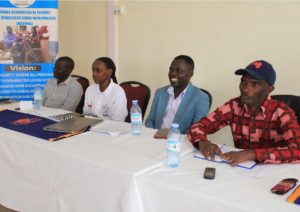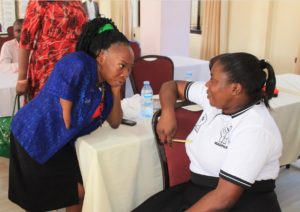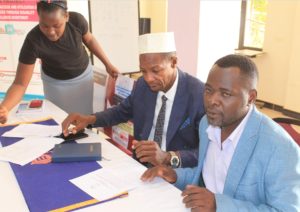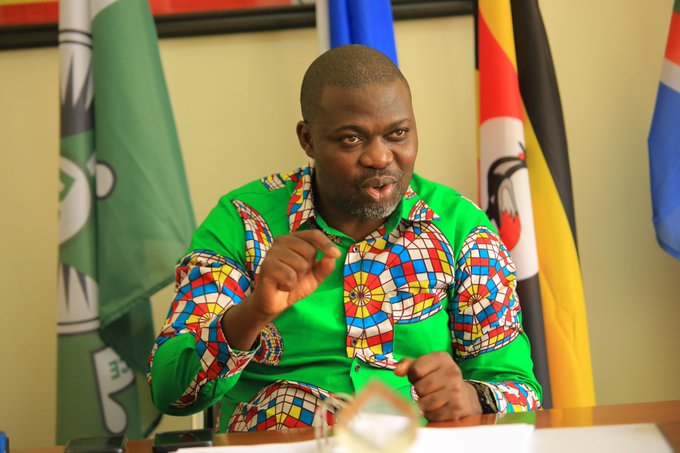FINDINGS: In a bid to establish the level of physical accessibility to the services provided at the health facilities for people with disabilities for advocacy and awareness raising for the realization of universal accessibility of health facilities by persons with disabilities, Masaka Association of Persons with Disability Living with HIV&AIDS (MADIPHA) Commissioned the Accessibility Assessments of five health facilities providing TB and HIV/AIDS services in the Greater Masaka Region and came up a sumary of findings.
With funding from the Disability Rights Fund (DRF) and the STOP TB Partnership, MADIPHA found out that some drugs are not provided free of cost. For example, one respondent said she must buy her own Septrin tablets at an average of UGs 10,000 per month for paying for the medicine. In addition, she also must find UGs 12,000 for transport to the facility implying she must have an average of UGs 25,000 for each monthly visit to the health facility which she cannot guarantee given her precarious livelihood status.
While releasing the research findings at Maria Flo Hotel in Masaka City, the MADDIPHA Executive Director Mr. Richard Musisi said, Disability rehabilitative services are not integrated into TB and HIV/AIDS service delivery at the health facilities.
“People with disabilities that need TB and HIV/AIDS drugs along with other regular medication such as drugs for managing epilepsy cannot receive the drugs for their different conditions at the same service point. Most times they must travel to the respective hospital on different days thus increasing the cost of securing comprehensive disability and TB HIV/AIDS services.” Musisi said

The health facilities which were covered by the assessment include; Rakai Health Center IV (Rakai District), Butenga Health Center IV (Bukomansimbi District), Kyanamukaka Health Center IV (Masaka District, Kyetume Health Center III (Lwengo District) and Kalungu Health Center III (Kalungu District).
MADIPHA findings indicate, that unlike the HIV/AIDS focal persons, most TB focal persons said they do not provide Reasonable Accommodations for people with disabilities. Some stated that services were generally available for anyone who showed up at the health centre. All TB focal persons also informed the assessment team they did not collect any disability-disaggregated data. Limited awareness of disability concerns by TB focal persons is attributed to limited sensitization of this cadre of health workers about disability mainstreaming.
The report also indicates;
- Assistive devices like wheelchairs, crutches, spectacles, white canes, etc. are not distributed as part of the TB and HIV/AIDS package even though it is well known that people with disabilities are vulnerable to TB and HIV/AIDS; and, both TB and HIV/AIDS have been well established as causes and aggravators of disability.

- Although printed Information, Educational and Communication (IEC) materials play a major role in TB and HIV/AIDS service delivery, none of the five health facilities provided written information in alternative formats, e.g., Braille or large print for the visually impaired and other people with visual disabilities because health facilities do not receive budgets for transcribing IEC materials into alternative formats.
- None of the five health centres involved in the Accessibility Assessment operated an official program for providing sign language interpretation although several health workers acknowledged having received introduction to basic sign language by MADIPHA and other NGOs.
- Only 2 out of the five health facilities have main gates or main entrance to the facility entrances of 2 out of the 5 health facilities (Kyetume Health Center III in Lwengo District and Kyanamukaka Health IV) that satisfy all accessibility standards for persons with disabilities. It means people with disabilities struggle to access services at the other three facilities right from the main gate

On a sad note, the report indicates that latrines at all five health facilities did not meet the physical accessibility standards for people with disabilities. None of the Latrines at most health facilities presented inaccessibility right from the absence of demarcated paths from the treatment area, which is a major source of challenge for orientation for people with seeing difficulty and those using wheelchairs and crutches.
One of the respondents noted that, “When you are at the hospital, you fear going to the latrine because you might pick up other diseases. The latrines are usually far from the facilities, the paths are bushy and muddy during the rainy season. But even if your relative carries you to the latrine, you cannot find anywhere to place your hand for those of us who move with our hands. It is really bad for us. “
Absence of latrines designated for people with disabilities was another concern throughout the accessibility assessment because none of the facilities had separate latrines for women and men designated for people with disabilities.
On a very positive note, the accessibility assessment identified that;
- all health facilities which were involved in the assessment provide the stipulated range of TB and HIV/AIDS services in accordance with the stipulations of the National HIV/AIDS Response Plan and the TB and Leprosy Control Program.
- The TB and HIV/AIDS services are free of charge at government and NGO health facilities because the central government, district local administration, and development partners finance the services.
- The assessment established with evidence that drug supplies have significantly improved, and shortages are rare.
- The in-charges and Frontline HIV/AIDS service providers implement Reasonable Accommodations for People with Disabilities at HIV/AIDS and TB facilities. For example, people with disabilities do not line up at the facilities.

Based on findings of the accessibility assessment, for improving accessibility of TB and HIV/AIDS facilities MADIPHA recommends that;
1. The District Director for Health Services and the secretaries for health at District and Sub County level should ensure representation of people with disabilities on the Health Units Management Committees (HUMCS) in accordance with Affirmative Action Principles enshrined in the 1995 Constitution of Uganda which calls for representation of People with disabilities in all decision-making structures so that they advise appropriate Reasonable Accommodations for people with disabilities.
2. Elected councillors for people with disabilities and members of the District and Lower Disability Councils should intensify advocacy for the enforcement of the District Ordinance and Sub-County bi-laws on Disability inclusive TB and HIV/AIDS services, including appropriation of adequate budgets.
3. The Uganda AIDS Commission and the Ministry of Health should develop guidelines for “One Stop Centres” to enable people with disabilities to receive drugs for disability conditions like mental health and assistive devices as part of the comprehensive service package at the TB and HIV/AIDS facility.
4. The Ministry of Health, the TB and Leprosy Control Program and the Uganda AIDS Commission should allocate appropriate budgets and guidelines for HIV/AIDS and TB services to have on hand or be able to refer patients to assistive devices.

5. The National TB Control Program, Uganda AIDS Commission and development partners should provide information in alternative formats for people with seeing difficulties and those with print disabilities in alternative formats as part of their information education and communication strategy.
6. The Ministry of Health, Ministry of Public Service, Uganda AIDS Commission and the National TB Control Program should create posts for sign language interpreters at health facilities.
7. District engineers, Officers In-Charge of TB and HIV/AIDS health facilities should organize a learning visit to Rakai Hospital for a peer learning visit to draw practical lessons on implementation of universal designs that promote physical accessibility.
MADIPHA is an association of Persons with disabilities who have tested positive for HIV or are affected by TB, together with their family members. The Association started its operations in 2009 in the districts of Masaka, Kalungu, Lwengo, Bukomansimbi, and Rakai.
By Maurice Matovu and Nsubuga Robert
centralupdtaes31@gmail.com





